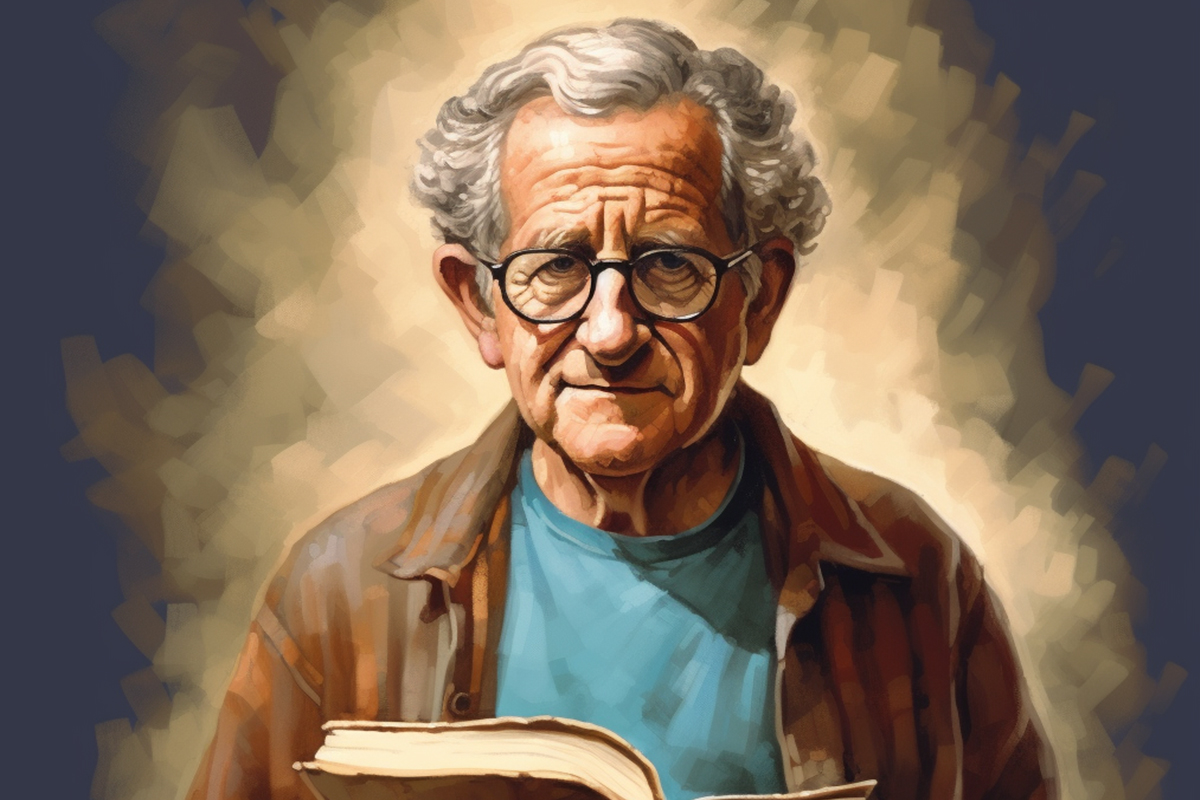Noam Chomsky is one of the most prominent intellectuals of our time. He has made significant contributions to the field of linguistics and has been an outspoken critic of political and economic systems. In this article, we will explore the ten best Noam Chomsky books for readers of all interests and backgrounds.

Understanding Noam Chomsky’s Impact on Linguistics and Political Thought
Noam Chomsky is a renowned American linguist, philosopher, and political activist who has made significant contributions to the fields of linguistics and political thought. His work has had a profound impact on these fields, shaping the way we understand language and society today.
Before diving into Chomsky’s books, it is important to understand his impact on both linguistics and political thought. Chomsky’s work has been influential in both areas, and his ideas have been the subject of much debate and discussion.
Chomsky’s Contributions to Linguistics
Chomsky’s work in linguistics has centered around the idea of universal grammar. Universal grammar is the idea that all human languages share a fundamental structure and that this structure is innate to humans. This means that all humans have an inherent ability to learn the language and that this ability is hardwired into our brains.
Chomsky’s theory of universal grammar has had a significant impact on the field of linguistics. It has led to the development of new theoretical frameworks for understanding language and language acquisition. Chomsky’s ideas have also challenged traditional views of language, which held that language was learned through imitation and reinforcement.
Chomsky’s early work in linguistics led to the publication of his book, Syntactic Structures, in 1957. This book introduced the idea of transformational grammar, which has become one of the most widely taught linguistic theories. Transformational grammar is based on the idea that there are deep structures and surface structures in language and that these structures can be transformed into one another through a series of rules.
Chomsky’s contributions to linguistics have been widely recognized, and he has received numerous awards and honors for his work. His ideas continue to shape the field of linguistics today, and his work remains an important part of the study of language.
Chomsky’s Influence on Political Activism
Chomsky’s political activism has also had a significant impact on the world. He has been an outspoken critic of U.S. foreign policy, the military-industrial complex, and neoliberal economic policies. Chomsky’s political views are based on the idea that power is concentrated in the hands of a few and that this concentration of power leads to inequality and injustice.
Chomsky’s work in this area has led to the publication of several influential books, including Manufacturing Consent: The Political Economy of the Mass Media and Hegemony or Survival: America’s Quest for Global Dominance. These books have been widely read and have had a significant impact on the way people think about politics and power.
Chomsky’s political activism has also led to his involvement in various social and political movements. He has been a vocal supporter of civil rights, anti-war protests, and environmental causes. Chomsky’s activism has inspired many people around the world to become more politically engaged and to fight for social justice.
In conclusion, Noam Chomsky’s impact on linguistics and political thought cannot be overstated. His contributions to these fields have been significant, and his ideas continue to shape the way we understand language and society today. Chomsky’s work serves as a reminder that language and politics are deeply interconnected, and that understanding one can help us better understand the other.
Top 5 Noam Chomsky Books for Linguistics Enthusiasts
If you are interested in linguistics, you are in for a treat! Noam Chomsky is one of the most influential linguists of all time. His theories and ideas have revolutionized the field of linguistics and have had a profound impact on other areas of study, such as philosophy, psychology, and computer science. Here are five of his essential books that every linguistics enthusiast should read:
Syntactic Structures (1957)
Syntactic Structures is a landmark book in the field of linguistics. In this book, Chomsky introduces the idea of transformational grammar, which suggests that the structure of a sentence can be represented by a set of rules that transform a deep structure into a surface structure. This theory has become one of the most widely taught linguistic theories and has had a significant impact on the field of linguistics.
Chomsky’s theory of transformational grammar was a departure from the behaviorist approach to language that was dominant at the time. Behaviorists believed that language was learned through imitation and reinforcement, whereas Chomsky argued that humans have an innate ability to acquire language and that the rules of language are hard-wired into our brains.
Aspects of the Theory of Syntax (1965)
Aspects of the Theory of Syntax build on the ideas presented in Syntactic Structures and introduces the idea of deep structure. Chomsky argues that every sentence has an underlying structure that is not directly observable but can be inferred from the surface structure of the sentence. This theory has been influential in the study of syntax and has led to the development of new techniques for analyzing sentence structure.
Chomsky’s theory of syntax has also been applied to other areas of study, such as computer science and artificial intelligence. The idea of deep structure has been used to develop natural language processing algorithms that can understand and generate human language.
Cartesian Linguistics: A Chapter in the History of Rationalist Thought (1966)
In Cartesian Linguistics, Chomsky explores the relationship between language and thought, focusing on the philosophical ideas of René Descartes. Chomsky argues that language is not just a means of communication but is also a reflection of our innate cognitive abilities. He suggests that language is a product of the human mind and that the structure of language reflects the structure of our thoughts.
Chomsky’s ideas in Cartesian Linguistics have been influential in the study of cognitive science and have led to new insights into the nature of human thought.
Language and Mind (1968)
Language and Mind is a collection of lectures given by Chomsky and provides an overview of his linguistic theories. The book covers a wide range of topics, including the nature of language, the relationship between language and thought, and the role of language in society.
The lectures in Language and Mind are accessible to a general audience and provide an excellent introduction to Chomsky’s ideas. The book has been widely read and has had a significant impact on the field of linguistics.
The Minimalist Program (1995)
The Minimalist Program introduces the minimalist approach to language, which suggests that language structure is determined by economic principles. Chomsky argues that the structure of language is the result of a set of principles that minimize the amount of computation required to generate and understand sentences.
The minimalist approach has been influential in the study of syntax and has led to new insights into the nature of language. The ideas presented in The Minimalist Program have also been applied to other areas of study, such as music theory and neuroscience.
So, there you have it! Five essential books by Noam Chomsky that every linguistics enthusiast should read. These books have had a profound impact on the field of linguistics and have led to new insights into the nature of language and human cognition.
Top 5 Noam Chomsky Books for Political Activists
If you are interested in political activism, these five books by Chomsky are essential reading:
Manufacturing Consent: The Political Economy of the Mass Media (1988)
In this book, Chomsky and co-author Edward S. Herman argue that the mass media plays a crucial role in shaping public opinion and consent. They argue that the media is largely controlled by powerful corporations and that it often serves the interests of those in power, rather than the interests of the general public. Chomsky and Herman also introduce the concept of “manufacturing consent,” which refers to the ways in which the media shapes public opinion by selectively presenting information and framing issues in a particular way.
Necessary Illusions: Thought Control in Democratic Societies (1989)
This book argues that democracies often engage in thought control and propaganda and that this is a natural consequence of the concentration of power. Chomsky argues that powerful institutions, such as the government and the media, use various techniques to control the way people think and to limit the range of acceptable ideas and opinions. Chomsky also argues that these techniques are often subtle and difficult to detect, making it all the more important for citizens to be vigilant and critical in their thinking.
Profit Over People: Neoliberalism and Global Order (1999)
In this book, Chomsky argues that neoliberal economic policies are a threat to democracy and human rights and that they are exacerbating social and economic inequality around the world. Chomsky contends that neoliberalism, which emphasizes free markets and privatization, has led to the concentration of wealth and power in the hands of a few while undermining the ability of governments to regulate markets and protect the interests of ordinary citizens. Chomsky also argues that neoliberalism has contributed to the rise of authoritarian regimes and the erosion of democratic institutions around the world.
Hegemony or Survival: America’s Quest for Global Dominance (2003)
This book argues that the United States is pursuing a policy of global dominance that threatens global stability and security. Chomsky contends that the US government, under the guise of promoting democracy and freedom, has been pursuing a policy of military and economic domination around the world. Chomsky argues that this policy has led to a rise in terrorism and anti-American sentiment and that it has undermined the ability of the US to act as a moral leader on the world stage.
Failed States: The Abuse of Power and the Assault on Democracy (2006)
This book argues that the United States and other Western democracies are failing to live up to their democratic principles and that this is leading to widespread human rights abuses and social and economic inequality. Chomsky contends that powerful institutions, such as the government and the media, are increasingly serving the interests of the wealthy and powerful, rather than the interests of the general public. Chomsky also argues that the US government has been complicit in a number of human rights abuses around the world, including torture and the suppression of dissent.
Conclusion
Noam Chomsky is a prolific and influential writer, with books on a wide range of topics. Whether you are interested in linguistics or political activism, these ten books are essential reading for anyone interested in understanding Chomsky’s ideas and impact.
FAQs
Who is Noam Chomsky?
Noam Chomsky is an American linguist, political activist, intellectual, and author who is referred to as the ‘father of modern linguistics’. He has had a long and inspiring career, significantly contributing to the fields of philosophy, linguistics, politics, and cognitive science.
Where is Noam Chomsky from?
He was born in Philadelphia and moved to Tucson, Arizona to work at the University of Arizona.
What are the best books written by Noam Chomsky?
He wrote influential works such as On Palestine, Who Rules the World?, Manufacturing Consent, Language and Mind, On Anarchism, and How the World Works.
- The 11 Best Books About Cats You Should Read - January 16, 2024
- The 9 Best Books on Building Confidence - January 16, 2024
- Discover the 10 Best Books on the Brain - January 16, 2024







